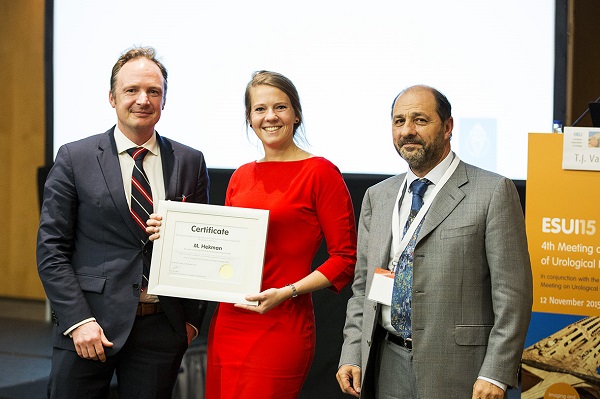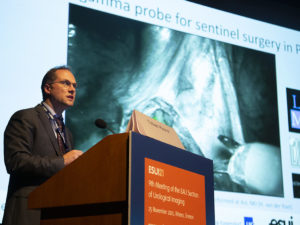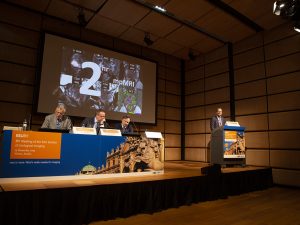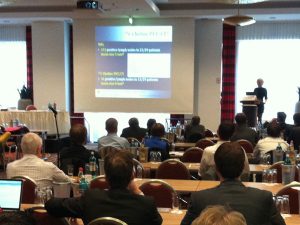Leading international experts active in imaging and image-guided treatment in urology gathered in Barcelona on 12 November for the 4th Meeting of the EAU Section of Urological Imaging (ESUI) which was held in conjunction with the 7th EMUC meeting.
The meeting critically addressed the most recent developments in imaging technologies and their clinical application in clinical practice. The ESUI meeting not only complemented the EMUC meeting but also gave ESUI the opportunity to offer a comprehensive programme with a high scientific quality.
The sessions were all marked by a very lively discussion and excellent interaction, proving that the idea of combining an imaging and multidisciplinary oncology meeting responds to the needs and demands of physicians active in urological oncology. Indeed, not only urologists participated in the meeting but also radiologists, oncologists, nuclear medicine physicians and engineers.
The meeting also had the support and participation of the European Society of Urogenital Radiology (ESUR) and the European Association of Nuclear Medicine (EANM). The programme, aside from complementing to the EMUC programme, offered key lectures that addressed the value of imaging in the management of urological malignancies and also other urological fields such as stone and upper urinary tract diseases. It is clear that the main advances in cancer management in the future will be driven by better imaging. Providing better detection, better staging, better follow up and salvage treatments will lead to improved and individualised treatment strategies. This observation was also reflected in the meeting’s theme “Imaging and individualised medicine.”
Outstanding presentations addressed key topics. Panel discussions and audience feedback also generated a number of interesting conclusions and participants went home with a set of actionable take-home messages and summaries, some of which are listed below:
Imaging and individualised medicine in urology
One of the main observations with regards to imaging technologies was that new developments added to the baseline technology will improve and increase the information generated with the “conventional” tool. This is especially true for stone disease when using the DYNA-CT, as well as for the management of upper urinary tract urothelial cancer when using NBI, SPIES and PDD. Moreover, high-resolution added to functional imaging allows for an individualise the treatment of bladder and kidney cancers.
New imaging technologies on the horizon
The fascinating session on new technologies proved that in the near future even better performances in diagnostics and treatment could be expected. Especially ultrasound-based imaging tools for prostate cancer such as ultrafast ultrasound and ultra-high frequency ultrasound will open up major possibilities for improvements.
Joint ESUI and EANM session
As in 2014 one of the highlights of the meeting was the joint meeting between the European Association of Nuclear Medicine (EANM) and the ESUI. The role of PET/CT in the different urological malignancies was critically assessed and clarified the value and limits of PET/CT in managing individual pathology. It became obvious that nuclear medicine is very rapidly evolving with a large number of new tracers coming up, particularly for prostate cancer. PSMA, in its derivatives, as well as Bombesin needs to be cited. The ESUI 2016 meeting will definitely continue this joint meeting to offer updates on new developments.
Best poster session and best poster award
The meeting also presented a successful poster session, with the prize for the best poster granted to Dr. M. Hekman from Nijmegen (NL) for her study entitled “Targeted dual-modality imaging in renal cell carcinoma: An ex vivo kidney perfusion study.” The number of abstracts submitted and published during the meeting increased substantially and the quality can be commended. We are confident future meetings will attract even more talented physicians, interested in urological imaging, to submit their latest research to our meetings.
How can imaging individualise and optimise PCa management?
Another highlight was the session which addressed PCa imaging, clearly one of the hottest topics in urological imaging. The session was opened by an excellent point-and-counterpoint discussion between Hashim Ahmed (UK) and this author who took pro and con positions regarding the capabilities of multiparametric MRI to detect or rule out significant prostate cancer. The debate followed by an in-depth assessment of new perspectives in ultrasound- based imaging tools and their combination of multiparametric ultrasound as well as in the critical assessment of multiparametric MRI and its use in diagnosis, staging and treatment decision making. Finally, the role of imaging in diagnosing and monitoring metastatic prostate cancer was assessed.
Future ESUI meetings
With the success of the 4th ESUI meeting, the 2016 meeting is scheduled with the theme “Imaging and shifting paradigms in urology” which will be held on 24 November, again in conjunction with the 8th EMUC in Milan. Save the date and see you in Milan!





